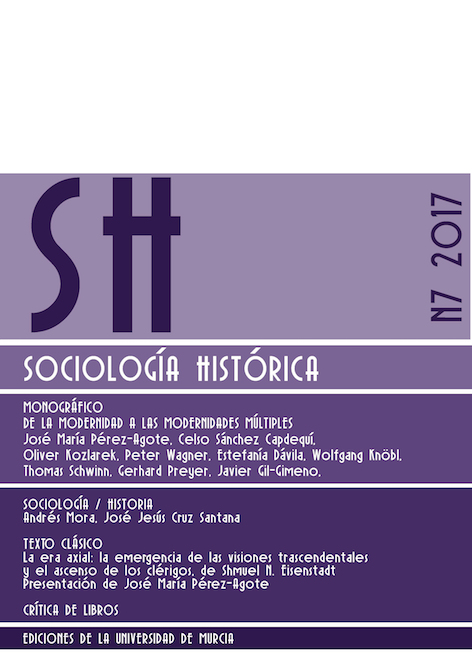Progress and modernity: the problem with autonomy
Resumen
The idea of modernity is inextricably tied up with the one of progress. One mainreason for this connection is that the late eighteenth century, often considered
to be the onset of modernity, was in Europe also seen as the dawn of a new
society evolving according to a different logic than any preceding one, namely
with an open horizon of future possibilities. This article explores the meaning of
this opening by first looking at the elaboration of what is called here a “strong
concept of progress”, based on the connection between autonomy and reason,
and by subsequently confronting this concept with the historical experiences
with progress. This confrontation helps to understand the transformations in the
expectations of progress from the middle of the nineteenth to the middle of the
twentieth century. As a result a more nuanced view of the relation between
progress and modernity will be proposed that can be fruitful for assessing our
current expectations of progress in the context of contemporary modernity.
Descargas
-
Resumen514
-
PDF 299
Las obras que se publican en esta revista están sujetas a los siguientes términos:
1. El Servicio de Publicaciones de la Universidad de Murcia (la editorial) conserva los derechos patrimoniales (copyright) de las obras publicadas, y favorece y permite la reutilización de las mismas bajo la licencia de uso indicada en el punto 2.
2. Las obras se publican en la edición electrónica de la revista bajo una licencia Creative Commons Reconocimiento-NoComercial-SinObraDerivada 4.0 España (texto legal). Se pueden copiar, usar, difundir, transmitir y exponer públicamente, siempre que: i) se cite la autoría y la fuente original de su publicación (revista, editorial y URL de la obra); ii) no se usen para fines comerciales; iii) se mencione la existencia y especificaciones de esta licencia de uso.
3. Condiciones de auto-archivo. Se permite y se anima a los autores a difundir electrónicamente las versiones pre-print (versión antes de ser evaluada) y/o post-print (versión evaluada y aceptada para su publicación) de sus obras antes de su publicación, ya que favorece su circulación y difusión más temprana y con ello un posible aumento en su citación y alcance entre la comunidad académica. Color RoMEO: verde.










